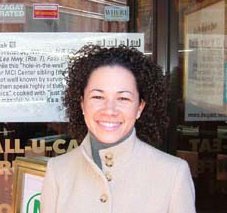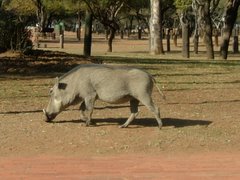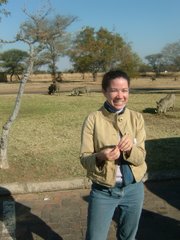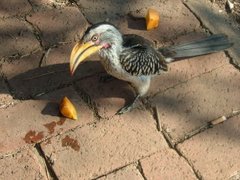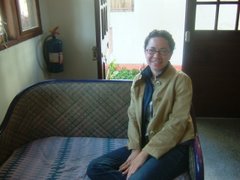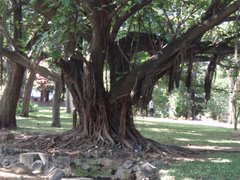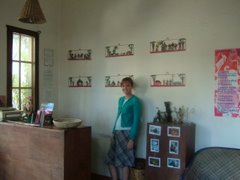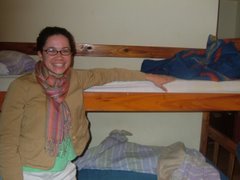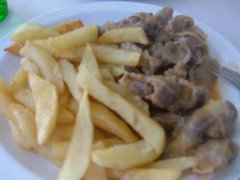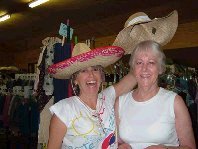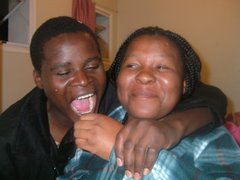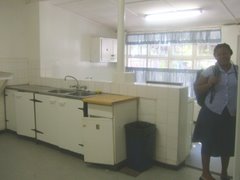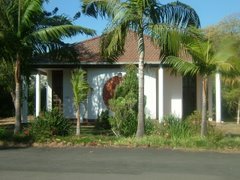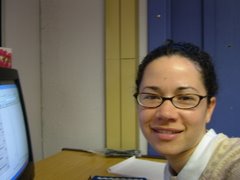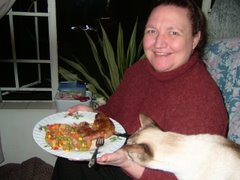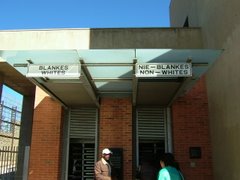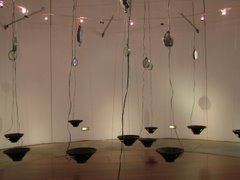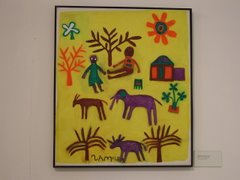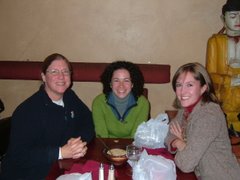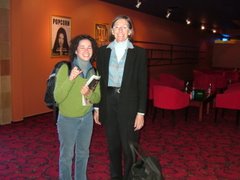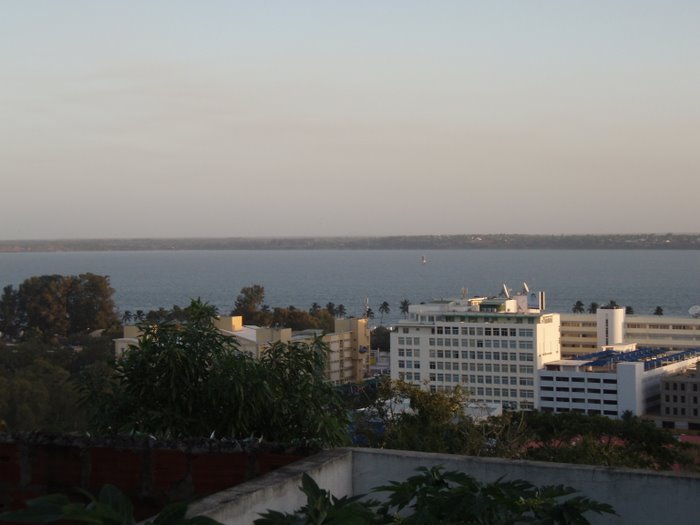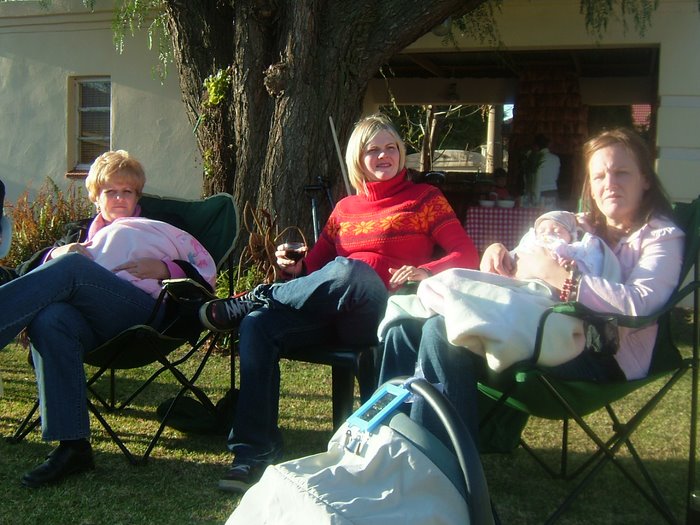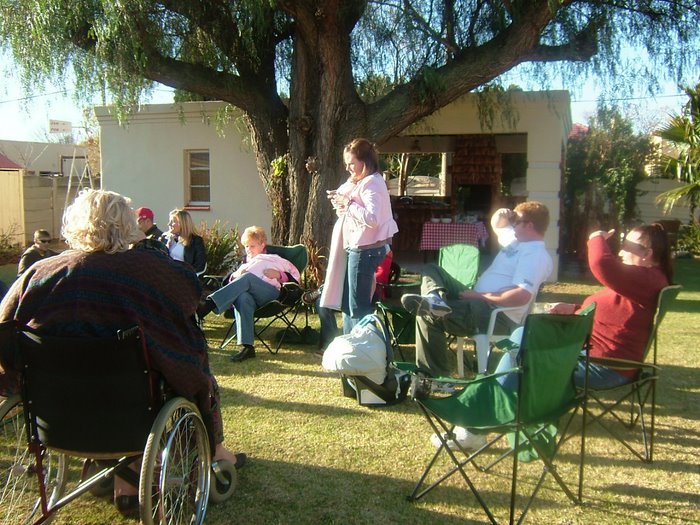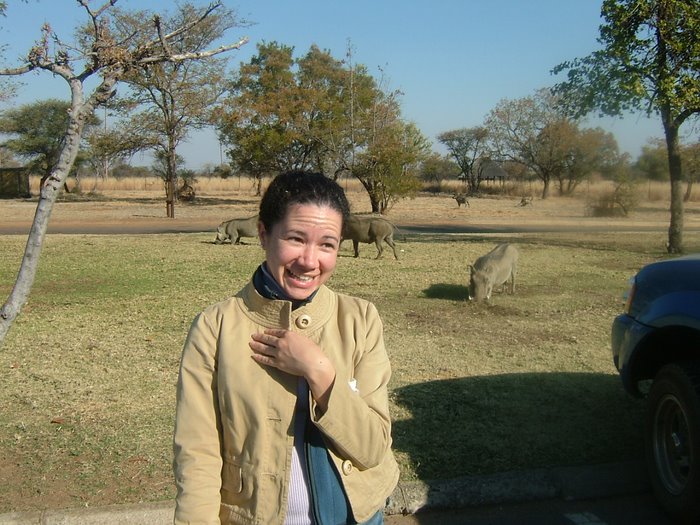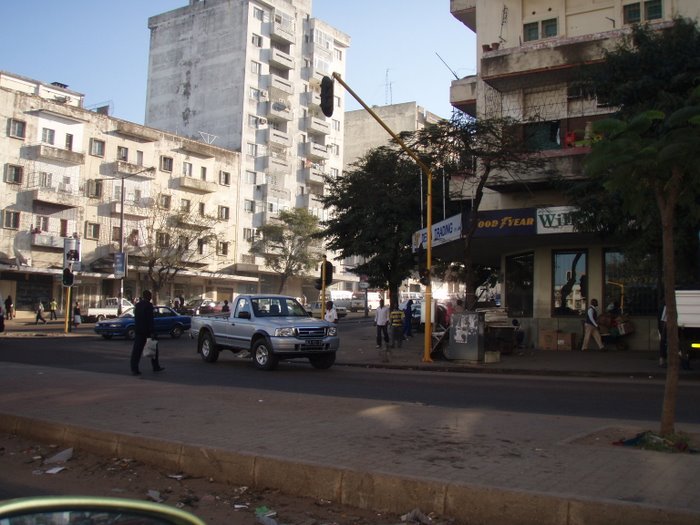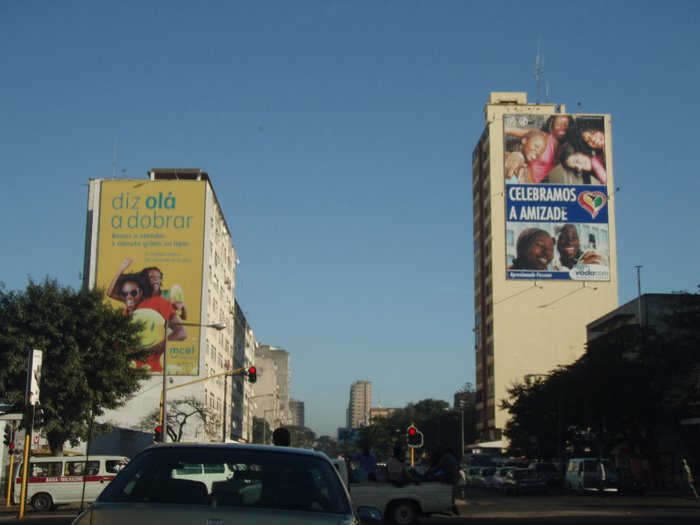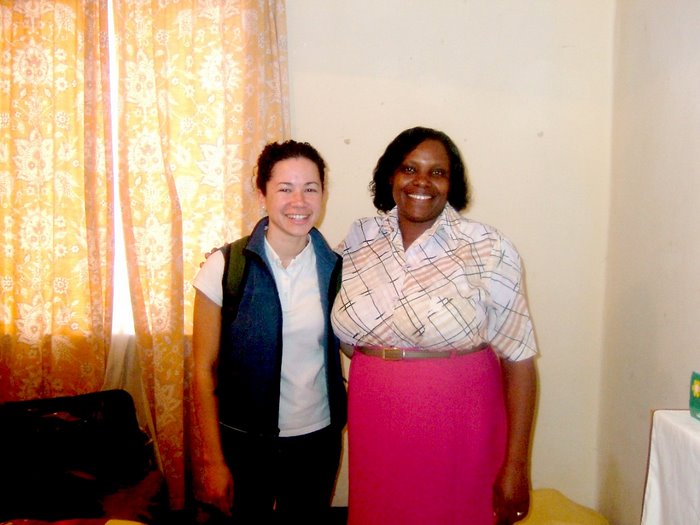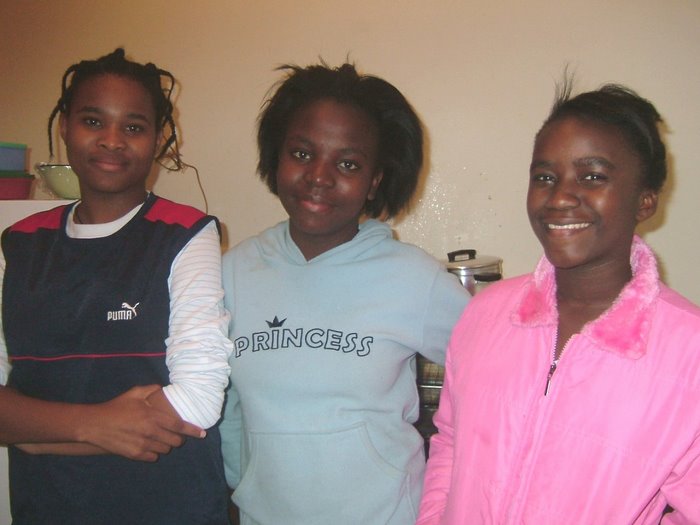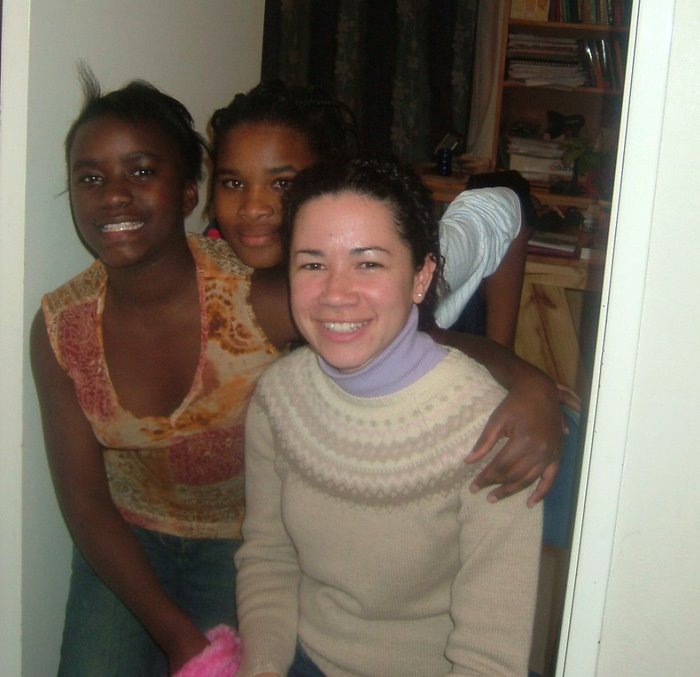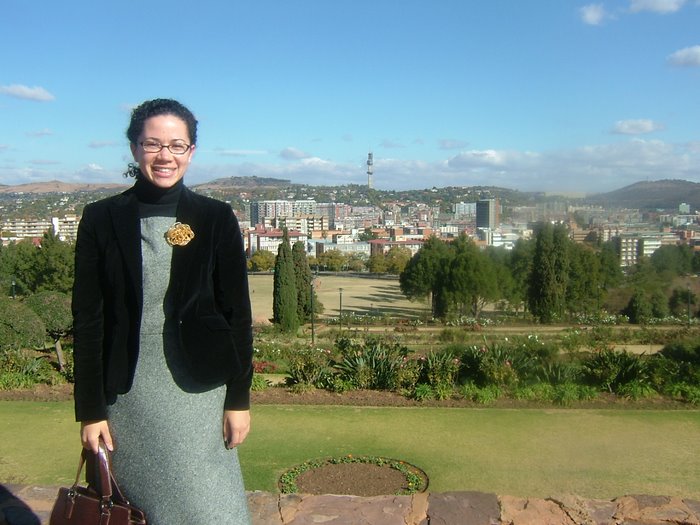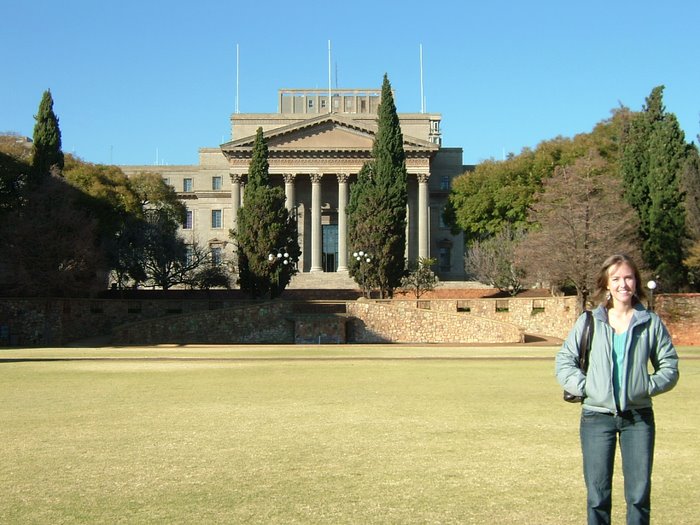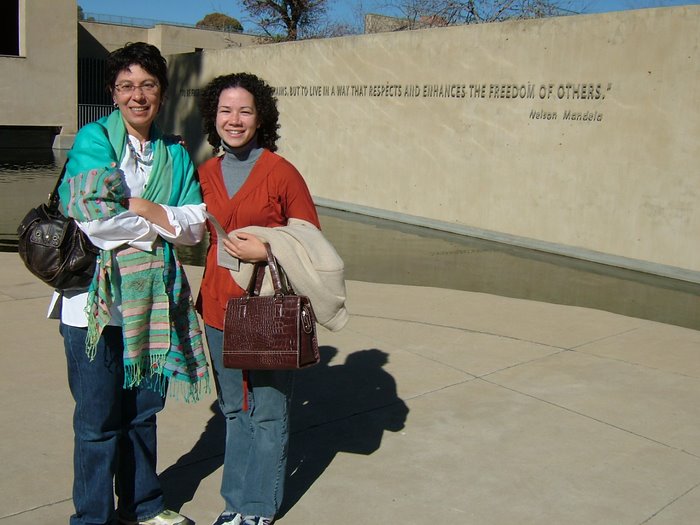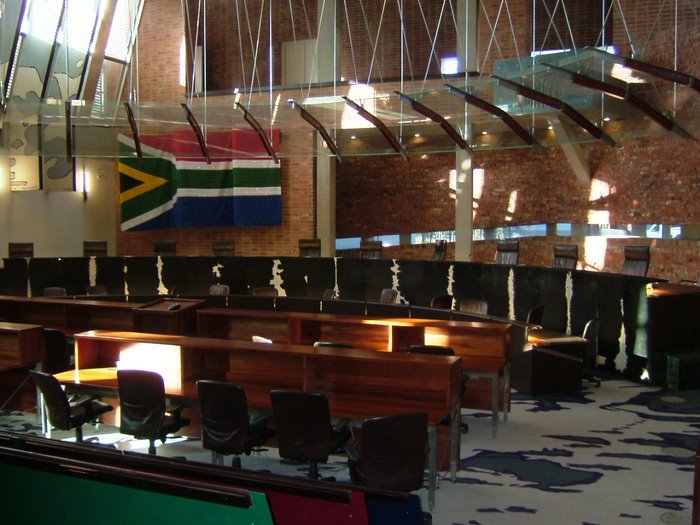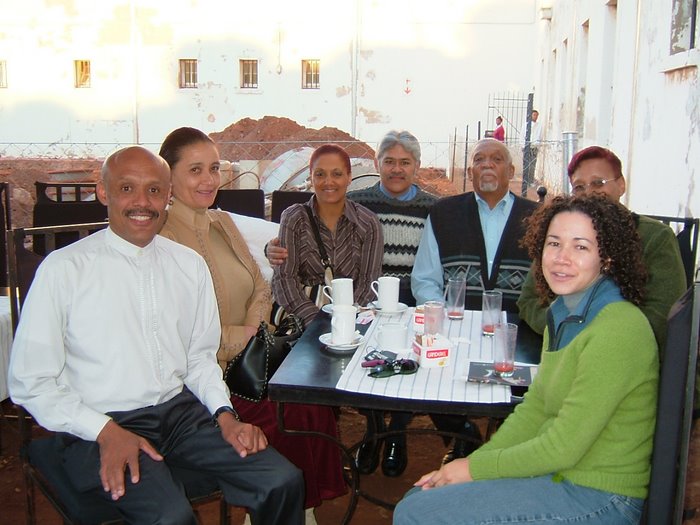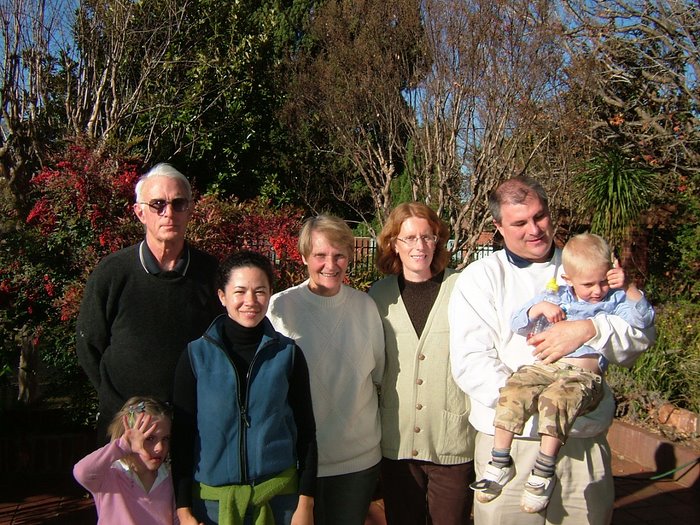Friday, July 27, 2007
Coming Home
I have just a few more days here in the TSA and I'm feeling a mixture of emotions. The conclusion of this experience has made me remember its beginning ... sitting on my sofa at home researching internship opportunities ... and from there to Pretoria South Africa with stress and joy in between. It has been a phenomenal experience. I've met some terrific people. And I'm sad about leaving. I thought that the excitement of seeing my friends and family would outweigh the sadness of leaving, and perhaps that will happen as I get closer to home ... but for right now I'm just very sad. I've started planting roots here ... friends, families, Sunday dinners, vacationing in Mozambique, work, Pretoria really did become my home for the 2 months that I was here. So I just wanted to write a special note to Magdalene, Sine, Bridget, Leighston, Simon, the Nkini family, the Ahlers family, Xafia, Helen, Jupiter, Kim, Karoo, Satchmo, Millie, Liz Mac, Victoria, Ursula, Pierre, Katy and Lisa Glenn, and BRI ... and on and on and on. And thanks to my family who read my blog religiously :) I'll see you all soon. Grateful, Kristian
Wednesday, July 18, 2007
The title of this entry could be "My Travels in Maputo, Mozambique" or "A Good Laugh at My Expense"
FYI - I posted three blog entries today, so be sure to read below to find my entries about African engagements and "the new South Africa."
Hi Friends,
I’ve just returned from my trip to Mozambique and I wanted to write to share with you all what that experience was like. I boarded a Greyhound bus on Thursday morning, before the sun came up, at 6:30 am and for the next 8 hours I traveled east through Nelspruit into Maputo. My host Helen packed a delicious gourmet lunch for me to take on the road. She says its just “the South Africa thing to do” to pack a lunch because the exits for food and the food selection can be very poor. So she bought me lots of fruit, guavas, Swiss chocolate, and mini sandwiches to take with. I’ve been so fortunate in that both of the people I’ve spent time with here in SA have been excellent cooks and have really spoiled me on SA cuisine. Well, after my meal had been devoured and I was peacefully resting, I was tapped on the shoulder by a man, a Greyhound employee. He asked whether I had a visa, and I said, “No, I was going to get one at the border.” (Now, this point in the story is where my Dad is probably starting to get nervous : ) … Now, online it does say that travelers can purchase a passport in advance or at the border, so I opted for the latter. Well, the bus man promptly informed me that everyone else purchased their visas in advance, and that they could not afford to wait for me to get mine at the border. So I just looked at him with wide eyes and laughed, “So you’re going to leave me at the border?” To which the bus employee sympathetically and reassuringly responded, … Stare … blink, blink … stare.
Okay, so at this point I’m wide awake. He tells me that as soon as the bus stops, I must be the first one off, that I must RUN to the post and pay for my visa and then RUN to catch the bus on the other side of the border. Apparently, there was one other fellow who had also neglected to get his visa ahead of time, so I locked eyes on the back of his head, and when the bus stopped, I followed him. The only problem was that this other guy started to RUN to the border station as the bus employee had instructed. And I really would have liked to run after him, but my pride got in the way : ) All I could bring myself to do was a fast-paced, brisk walk, with brief seconds of a run, tempered back into a walk. As was to be expected, I lost sight of the man’s head, and there I was, with no visa, no guide, no Portuguese proficiency and no clue at the border. So I just got in a line, somebody stamped something and directed me to walk to the Mozambique side of the border for the next required document. So I did. With turtleneck and layered jacket and backpack, I walked into HUMID Mozambique and waited in along line (called a que … pronounced “K”) sweating all the way. I found the back of the guy’s head, and he very graciously helped me fill out the forms. Now, at this point in the game, having heard stories from friend, I was fully prepared to have to offer a bribe to expedite the issuance of my Mozambiquean passport, but none was solicited or offered. So, congratulations to the Mozambiquean government :) The whole thing was above the table. I got my visa, found the bus, and hopped back on, after which I started thinking, “I can’t believe I just did that.” When I came into Mozambique the first time with a group of 20 students from Birmingham-Southern, I didn’t feel any sense of personal responsibility because someone else (Stewart Jackson) was handling all the logistical details, all the money, all the communicating, all the visas and passports, such that I could just sit back and let someone else take care of it. This time was obviously different, and in retrospect, I’m actually proud that I was able to navigate an intimidating and unfamiliar situation with no fluency in Portuguese and no disasters. Experiences like this have really taught me that I’m not as frail as I initially imagined, and that I’m capable of much more than I give myself credit for … and also, that I’ve been very protected and blessed not to have run into any problems along the way.
So we arrive at the Maputo bus station, and the man who helped me with my visa application helped me to get a cab, which drove me to the Base Backpackers where I was to meet up with my friend Lisa Glenn (who had also visited Mozambique as a BSC student). It was essentially a three-story house with 5 large bedrooms that had several bunk-beds in each. It was simply but nicely decorated, with internet access, and a kitchen so that we could cook meals. It was only 60 Rand per night, which converts into $10 US dollars a night, which is a stellar price considering how clean and tidy it was. The first night that we were there, we drove past the Methodist guesthouse where I’d stayed on my first visit, and Lisa drove us to Costa del Sol, where we had eaten with our group from BSC. It was nice because then the city felt somewhat familiar and it made me think about the person that I was on my first trip there in comparison to the person that I am becoming.
The next day, Lisa’s friends drove north to Tofu, which boasts very beautiful beaches. Lisa and I stayed in Maputo, visited the art museum, which was amazing. First, in a third world country, it’s impressive that resources should be allocated to the promotion and celebration of local artists. The museum is well-designed, with track lighting, two stories, and a beautiful staircase. What’s most amazing about the works featured there is that almost all of them revolve around themes of starvation, political struggle, limited resources, and crowdedness. You can see the crowdedness in the tall, carved Makonde statutes, http://www.blackwoodconservation.org/carving.html a theme which is mirrored in paintings of congested streets full of faces. And even the way in which the pieces are displayed could be considered crowded. In the States, the paintings are spread out so that each can be experienced individually, but in this museum, they are crammed together with sometimes less than 10 inches between them. Scattered sparingly throughout the museum were more modern pieces using more vibrant, primary colors. One notable difference between the works exhibited in Maputo and in the States is that the ones in Maputo all have the same or similar frames. In the States, the frame itself is considered a part of or critical addition to the work of art, but in Maputo almost every work had a simple, thin, wooden frame that doesn’t add to or detract from the painting.
Lisa and I then ventured to the craft market that is held every Saturday in the park. On my first visit here, I fell prey to the kitsch, but this time I was much more thoughtful in buying pieces that are really amazing. Mother collects driftwood, and there was this one man selling a piece of sandalwood that bore a resemblance to an elephant, so he polished the inside and carved an eyeball here, a tusk there, and it was really a magnificent thing. There was an artist there, Simone’, who was doing really innovative things capturing moments in African life. For example, he created an African nativity scene but instead of it taking place in a manger, the baby Jesus was lying in a hollowed out tree and women bearing gifts of guinea fowl, flour, etc. were there to celebrate his birth. He had another scene of a woman on a doctor’s table giving birth. But wait, wait, wait – don’t picture a serious scene … picture vibrant primary colors conveying a festive, almost comical feel. He’s really talented and on top of that, he has a kind spirit, so it was a pleasure meeting him. In a market full of Africa-shaped magnets and manufactured cloth, his pieces were very modern, vibrant, and novel.
After we left the craft market, we stopped by these tennis courts near our guesthouse. Okay, again, don’t picture pristine tennis courts … picture a sidewalk with huge potholes in it, leading to park benches where you can watch young kids competing in Saturday competitions. The courts themselves were well-cared for. Well, behind the courts was a little outdoor restaurant, so Lisa and I decided to eat there. The entire menu was in Portuguese and the little that we knew didn’t help us, so I decided to be adventurous and order “moelas estufadas.” I was thinking that it must be some stuffed vegetable, which I would recognize as soon as it was delivered to the table. That’s what we call as “assumption.” Well, more precisely, that’s what we call an “incorrect assumption.” My plate was delivered and on the left were typical Mozambique French fries (thick and oily). On the right was something I have never seen before, but I decided to eat it first and look up the word, “moelas” in the dictionary later. Turns out moelas are something akin to chicken giblets : ) Then on the walk home, we were privy to seeing a woman on the way to her wedding. From the second she walked out the door to get in her car, her female relatives surrounded her singing. Loudly. They walked slowly to the curb and then this car decorated in white tool and gold ribbon picked her up. It was nice to watch and Lisa and I tried to guess what the words to the Portuguese song were.
Then on Sunday, we went to this Anglican church because they had an English service. We met a nice family there, the Nkinis, who invited us to church afterwards. Their yard reminded me of the one another of my friends from Africa described. They had a mango tree, an avocado tree, an orange and lemon tree. Only the latter two were in bloom, so their gardener climbed the trees and pulled down several (“narches”) for dessert. They had two kitchens, one inside the house an another in their backyard where the do the real cooking. I asked Mrs. Nkini why she had two and she wrinkled her face and explained that otherwise her children would make a mess in the kitchen and it would be dirty. Then my mother’s voice rang in the back of my head and I understood perfectly :) So, one kitchen was for looks and the other for work. Okay, on that note, I've got to run.
Hi Friends,
I’ve just returned from my trip to Mozambique and I wanted to write to share with you all what that experience was like. I boarded a Greyhound bus on Thursday morning, before the sun came up, at 6:30 am and for the next 8 hours I traveled east through Nelspruit into Maputo. My host Helen packed a delicious gourmet lunch for me to take on the road. She says its just “the South Africa thing to do” to pack a lunch because the exits for food and the food selection can be very poor. So she bought me lots of fruit, guavas, Swiss chocolate, and mini sandwiches to take with. I’ve been so fortunate in that both of the people I’ve spent time with here in SA have been excellent cooks and have really spoiled me on SA cuisine. Well, after my meal had been devoured and I was peacefully resting, I was tapped on the shoulder by a man, a Greyhound employee. He asked whether I had a visa, and I said, “No, I was going to get one at the border.” (Now, this point in the story is where my Dad is probably starting to get nervous : ) … Now, online it does say that travelers can purchase a passport in advance or at the border, so I opted for the latter. Well, the bus man promptly informed me that everyone else purchased their visas in advance, and that they could not afford to wait for me to get mine at the border. So I just looked at him with wide eyes and laughed, “So you’re going to leave me at the border?” To which the bus employee sympathetically and reassuringly responded, … Stare … blink, blink … stare.
Okay, so at this point I’m wide awake. He tells me that as soon as the bus stops, I must be the first one off, that I must RUN to the post and pay for my visa and then RUN to catch the bus on the other side of the border. Apparently, there was one other fellow who had also neglected to get his visa ahead of time, so I locked eyes on the back of his head, and when the bus stopped, I followed him. The only problem was that this other guy started to RUN to the border station as the bus employee had instructed. And I really would have liked to run after him, but my pride got in the way : ) All I could bring myself to do was a fast-paced, brisk walk, with brief seconds of a run, tempered back into a walk. As was to be expected, I lost sight of the man’s head, and there I was, with no visa, no guide, no Portuguese proficiency and no clue at the border. So I just got in a line, somebody stamped something and directed me to walk to the Mozambique side of the border for the next required document. So I did. With turtleneck and layered jacket and backpack, I walked into HUMID Mozambique and waited in along line (called a que … pronounced “K”) sweating all the way. I found the back of the guy’s head, and he very graciously helped me fill out the forms. Now, at this point in the game, having heard stories from friend, I was fully prepared to have to offer a bribe to expedite the issuance of my Mozambiquean passport, but none was solicited or offered. So, congratulations to the Mozambiquean government :) The whole thing was above the table. I got my visa, found the bus, and hopped back on, after which I started thinking, “I can’t believe I just did that.” When I came into Mozambique the first time with a group of 20 students from Birmingham-Southern, I didn’t feel any sense of personal responsibility because someone else (Stewart Jackson) was handling all the logistical details, all the money, all the communicating, all the visas and passports, such that I could just sit back and let someone else take care of it. This time was obviously different, and in retrospect, I’m actually proud that I was able to navigate an intimidating and unfamiliar situation with no fluency in Portuguese and no disasters. Experiences like this have really taught me that I’m not as frail as I initially imagined, and that I’m capable of much more than I give myself credit for … and also, that I’ve been very protected and blessed not to have run into any problems along the way.
So we arrive at the Maputo bus station, and the man who helped me with my visa application helped me to get a cab, which drove me to the Base Backpackers where I was to meet up with my friend Lisa Glenn (who had also visited Mozambique as a BSC student). It was essentially a three-story house with 5 large bedrooms that had several bunk-beds in each. It was simply but nicely decorated, with internet access, and a kitchen so that we could cook meals. It was only 60 Rand per night, which converts into $10 US dollars a night, which is a stellar price considering how clean and tidy it was. The first night that we were there, we drove past the Methodist guesthouse where I’d stayed on my first visit, and Lisa drove us to Costa del Sol, where we had eaten with our group from BSC. It was nice because then the city felt somewhat familiar and it made me think about the person that I was on my first trip there in comparison to the person that I am becoming.
The next day, Lisa’s friends drove north to Tofu, which boasts very beautiful beaches. Lisa and I stayed in Maputo, visited the art museum, which was amazing. First, in a third world country, it’s impressive that resources should be allocated to the promotion and celebration of local artists. The museum is well-designed, with track lighting, two stories, and a beautiful staircase. What’s most amazing about the works featured there is that almost all of them revolve around themes of starvation, political struggle, limited resources, and crowdedness. You can see the crowdedness in the tall, carved Makonde statutes, http://www.blackwoodconservation.org/carving.html a theme which is mirrored in paintings of congested streets full of faces. And even the way in which the pieces are displayed could be considered crowded. In the States, the paintings are spread out so that each can be experienced individually, but in this museum, they are crammed together with sometimes less than 10 inches between them. Scattered sparingly throughout the museum were more modern pieces using more vibrant, primary colors. One notable difference between the works exhibited in Maputo and in the States is that the ones in Maputo all have the same or similar frames. In the States, the frame itself is considered a part of or critical addition to the work of art, but in Maputo almost every work had a simple, thin, wooden frame that doesn’t add to or detract from the painting.
Lisa and I then ventured to the craft market that is held every Saturday in the park. On my first visit here, I fell prey to the kitsch, but this time I was much more thoughtful in buying pieces that are really amazing. Mother collects driftwood, and there was this one man selling a piece of sandalwood that bore a resemblance to an elephant, so he polished the inside and carved an eyeball here, a tusk there, and it was really a magnificent thing. There was an artist there, Simone’, who was doing really innovative things capturing moments in African life. For example, he created an African nativity scene but instead of it taking place in a manger, the baby Jesus was lying in a hollowed out tree and women bearing gifts of guinea fowl, flour, etc. were there to celebrate his birth. He had another scene of a woman on a doctor’s table giving birth. But wait, wait, wait – don’t picture a serious scene … picture vibrant primary colors conveying a festive, almost comical feel. He’s really talented and on top of that, he has a kind spirit, so it was a pleasure meeting him. In a market full of Africa-shaped magnets and manufactured cloth, his pieces were very modern, vibrant, and novel.
After we left the craft market, we stopped by these tennis courts near our guesthouse. Okay, again, don’t picture pristine tennis courts … picture a sidewalk with huge potholes in it, leading to park benches where you can watch young kids competing in Saturday competitions. The courts themselves were well-cared for. Well, behind the courts was a little outdoor restaurant, so Lisa and I decided to eat there. The entire menu was in Portuguese and the little that we knew didn’t help us, so I decided to be adventurous and order “moelas estufadas.” I was thinking that it must be some stuffed vegetable, which I would recognize as soon as it was delivered to the table. That’s what we call as “assumption.” Well, more precisely, that’s what we call an “incorrect assumption.” My plate was delivered and on the left were typical Mozambique French fries (thick and oily). On the right was something I have never seen before, but I decided to eat it first and look up the word, “moelas” in the dictionary later. Turns out moelas are something akin to chicken giblets : ) Then on the walk home, we were privy to seeing a woman on the way to her wedding. From the second she walked out the door to get in her car, her female relatives surrounded her singing. Loudly. They walked slowly to the curb and then this car decorated in white tool and gold ribbon picked her up. It was nice to watch and Lisa and I tried to guess what the words to the Portuguese song were.
Then on Sunday, we went to this Anglican church because they had an English service. We met a nice family there, the Nkinis, who invited us to church afterwards. Their yard reminded me of the one another of my friends from Africa described. They had a mango tree, an avocado tree, an orange and lemon tree. Only the latter two were in bloom, so their gardener climbed the trees and pulled down several (“narches”) for dessert. They had two kitchens, one inside the house an another in their backyard where the do the real cooking. I asked Mrs. Nkini why she had two and she wrinkled her face and explained that otherwise her children would make a mess in the kitchen and it would be dirty. Then my mother’s voice rang in the back of my head and I understood perfectly :) So, one kitchen was for looks and the other for work. Okay, on that note, I've got to run.
The New South Africa
I’ve come across an incredibly witty and insightful book commenting on life in ‘the new South Africa.’ The book was actually published in 1991, so its interesting to note how many of the author’s critical observations either remain relevant 16 years later or forebode times to come. The following is an excerpt:
“As the ripples of F W de Klerk’s historic speech spread to every corner of the land, one phrase rose like a ripple rising to the surface. It was a simple phrase that seemed to capture and define the spirit of the new South Africa and soon, almost before you could say ‘New South Africa’ the phrase was being heard on everybody’s lips. New South Africa. It was a phrase that had not been heard in this troubled land since 1984, when the Westminster Constitutional system had been abolished …. Before that the phrase had not been heard since 1961, when the Union of South Africa had withdrawn from the Commonwealth … Before that the phrase had not been heard since 1948 when the National Party rose to power and began building a New South Africa based on a foundation of democracy, prosperity, justice, and equality for all whites.”
It Take Two to Toyi-Toyi: A Survival Guide to the New South Africa, Gus Silber
It was this tongue in cheek excerpt which helped me realize that although people herald 1994 as THE critically defining moment in all of South African history, maybe Mandela’s election was not so much the event that changed everything, as simply one moment in time. I mean this: I think I previously assumed that the moment Nelson Mandela was elected signaled a permanent commitment to democracy from thence forth, changing everything. But history often mocks such assumptions as the pendulum swings in the opposite direction. Things simply aren’t as inevitable or fixed or permanently better. One New South Africa follows another. I hope this doesn’t come off as me wishing gloom and doom on the new South Africa. No, I’m just saying that South African has been through several periods of transition and where I previously assumed that this most recent was a pivotal climax, a final achievement, I’m coming to see that things aren’t so stable or secure. I’ve rambled and don’t feel that I’ve adequately conveyed my point, but I don’t know how better to phrase it. Basically, I'm saying that perhaps another New South Africa will follows this experiment, and I wonder what it will look like, and how committed it will be to the principles that this current government has advocated.
“As the ripples of F W de Klerk’s historic speech spread to every corner of the land, one phrase rose like a ripple rising to the surface. It was a simple phrase that seemed to capture and define the spirit of the new South Africa and soon, almost before you could say ‘New South Africa’ the phrase was being heard on everybody’s lips. New South Africa. It was a phrase that had not been heard in this troubled land since 1984, when the Westminster Constitutional system had been abolished …. Before that the phrase had not been heard since 1961, when the Union of South Africa had withdrawn from the Commonwealth … Before that the phrase had not been heard since 1948 when the National Party rose to power and began building a New South Africa based on a foundation of democracy, prosperity, justice, and equality for all whites.”
It Take Two to Toyi-Toyi: A Survival Guide to the New South Africa, Gus Silber
It was this tongue in cheek excerpt which helped me realize that although people herald 1994 as THE critically defining moment in all of South African history, maybe Mandela’s election was not so much the event that changed everything, as simply one moment in time. I mean this: I think I previously assumed that the moment Nelson Mandela was elected signaled a permanent commitment to democracy from thence forth, changing everything. But history often mocks such assumptions as the pendulum swings in the opposite direction. Things simply aren’t as inevitable or fixed or permanently better. One New South Africa follows another. I hope this doesn’t come off as me wishing gloom and doom on the new South Africa. No, I’m just saying that South African has been through several periods of transition and where I previously assumed that this most recent was a pivotal climax, a final achievement, I’m coming to see that things aren’t so stable or secure. I’ve rambled and don’t feel that I’ve adequately conveyed my point, but I don’t know how better to phrase it. Basically, I'm saying that perhaps another New South Africa will follows this experiment, and I wonder what it will look like, and how committed it will be to the principles that this current government has advocated.
Tuesday, July 17, 2007
African Engagements
I wanted to congratulate my friend Monica on her engagement to Katende and to wish them well as they have their engagement celebration this weekend, which I will miss as I am not in the country. I'm also going to miss it because, as several of my African friends have shared with me, it's an interesting cultural experience. Both Monica and my friend Sine have explained that when a man asks for a woman's hand in marriage, 1) he's not really asking her - he's asking her family. And so this man must be prepared to exercise a great deal of persistence because the family may try to scare him away. They ask invasive questions about his family, his education, his earning potential, his previous relationships, ... basically anything they want. They send him away several times, in part to see if he will persist and come back and continue to ask for this woman's hand in marriage. They may insult him and his family (even in the presence of his family members) ... but in the end if he's still around (and can pay the dowry price :) then the couple can wed. Well, to hear Sine and Monica describe this process, it can sound horrible, but last Sunday I actually got to see a preview and its actually a very comical and entertaining thing. So, here's how it happened.
I went to this Anglican church, and this couple stood up because they were engaged and soon to be married. The pastor announced their engagement and then asked if anyone knew of any reason that they should not wed? Of course, no one said anything, and I expected that the couple would then sit back down, but the pastor proceeded to probe further ...
"Does anyone know of any reason this couple shouldn't be married? ... any reason at all ... People should feel free to voice any concerns that they have, any concerns at all .... Does anyone know of any mental disabilities that either of these young people suffer from such that they are not in the right frame of mind to marry? ... or does anyone here know if either of them is already married ... or if this man is a womanizer ... or if this woman is no good ... or if they're not physically able to marry ... and on and on and on it went. To make it more embarrassing for the couple, the pastor frequently paused to give anyone an opportunity to speak, and also to give the congregation a chance to chuckle :) so the entire congregation was having a good time ribbing this couple and it was sort of like at any moment, someone might jump up and air all your dirty laundry :)
So I'm sorry that I'm going to miss Katende and Monica's ribbing, but I wish them the best and look forward to the wedding. Congratulations :)
I went to this Anglican church, and this couple stood up because they were engaged and soon to be married. The pastor announced their engagement and then asked if anyone knew of any reason that they should not wed? Of course, no one said anything, and I expected that the couple would then sit back down, but the pastor proceeded to probe further ...
"Does anyone know of any reason this couple shouldn't be married? ... any reason at all ... People should feel free to voice any concerns that they have, any concerns at all .... Does anyone know of any mental disabilities that either of these young people suffer from such that they are not in the right frame of mind to marry? ... or does anyone here know if either of them is already married ... or if this man is a womanizer ... or if this woman is no good ... or if they're not physically able to marry ... and on and on and on it went. To make it more embarrassing for the couple, the pastor frequently paused to give anyone an opportunity to speak, and also to give the congregation a chance to chuckle :) so the entire congregation was having a good time ribbing this couple and it was sort of like at any moment, someone might jump up and air all your dirty laundry :)
So I'm sorry that I'm going to miss Katende and Monica's ribbing, but I wish them the best and look forward to the wedding. Congratulations :)
Wednesday, July 11, 2007
Traveling from Pretoria to Tshwane
Hi friends, I wanted to share and then comment on one of the bubbling controversies here in South Africa. In the past few years, the government has dedicated billions of Rand to changing the names of cities, public facilities such as the O.R. Tambo Airport (formerly known as the Jan Smutts International Airport), and they are currently in the process of changing street names. As you might imagine, given the serious practical and life-threatening concerns that plague the country (HIV/AIDS, a new drug-resistant strain of TB, child-headed households, child abuse, poverty, lack of housing and education, high unemployment, illegal immigration, and the deteriorating situation in neighboring Zimbabwe, … you can imagine the sort of criticism that has accompanied this government initiative which is spending billions to change some names. In short, people complain, understandably so, that there are far more practical and pressing demands than the renaming of streets, cities, and parks. And giving merit to their argument is the fact that it takes significant amount of money to fund the transition in names. 1.5 billion Rand is the projected cost of changing the capital city’s name from Pretoria to Tshwane. And that figure doesn’t even take into account the additional $ needed to change the names of street, parks, and libraries throughout the rest of the country. http://en.wikipedia.org/wiki/Tshwane
Initially I didn’t appreciate why it would cost so much, but if you think about it, changing a name is not so simple as simply changing it on the maps and then waiting for everyone to follow suit in speech. No, every text book and map (nationally and internationally) has to be modified. Skilled and multi-lingual personnel has to be hired and trained to successfully transmit that message abroad. There’s the business transaction cost associated with such a transition, as cab drivers, postal employees, package delivery companies, etc. re-learn routes. And then there are a million and one more unanticipated ways in which the simple decision to change a city or street name costs money. There’s the re-printing of stationary, letterhead, business cards, telephone directories, and the like, all across the country. As anticipated, then, aside from the monetary expense, there’s also a measurable environmental impact as natural resources are used to accomplish this. So given this cost, there’s been quite a bit of opposition to the project. During the past month, I’ve heard opposition voiced from people of various ethnic and racial backgrounds, and surprisingly, the criticism was across the board. Not once did I hear an average joe voicing support for the project, such that I had to try and figure out for myself what the rationale might be. I imagine that where the criticism of the project is quite practical, framed in terms of costs and expenditures, the praise of the project is more symbolic and ideological. I imagine that supporters might pose this question to us: “How does one build a country?” When the buildings and infrastructure, roads and malls, libraries and eateries already exist, how does one then begin to re-build a country previously grounded in racism. Is it strictly a matter of tearing down the negative structures that oppress? Or is it also a matter of constructing something positive from the rubble? If the new South Africa is about more than tearing down, if it is in the process of building up, then how does that building up take shape? What policies, practically speaking, does one institute? Perhaps the answer is that if the battle itself is an ideological one (convincing people of the evil of racism and oppressive policies which denigrate human rights) then mustn’t the remedies also be ideological? And isn’t the renaming of streets and towns one ideological measure intended to honor those who laid the ideological foundational framework for ‘the New South Africa’? I think that this is one argument likely advanced by those in favor of the name-change. In short, I think that there are valid points to be made on both sides. Yes, perhaps the cost is tremendous, but we must also acknowledge that there are things more valuable than Dollars and Rand (including a country’s sense of national pride and commitment to ideological principles in the face of their oppressive history).
Initially I didn’t appreciate why it would cost so much, but if you think about it, changing a name is not so simple as simply changing it on the maps and then waiting for everyone to follow suit in speech. No, every text book and map (nationally and internationally) has to be modified. Skilled and multi-lingual personnel has to be hired and trained to successfully transmit that message abroad. There’s the business transaction cost associated with such a transition, as cab drivers, postal employees, package delivery companies, etc. re-learn routes. And then there are a million and one more unanticipated ways in which the simple decision to change a city or street name costs money. There’s the re-printing of stationary, letterhead, business cards, telephone directories, and the like, all across the country. As anticipated, then, aside from the monetary expense, there’s also a measurable environmental impact as natural resources are used to accomplish this. So given this cost, there’s been quite a bit of opposition to the project. During the past month, I’ve heard opposition voiced from people of various ethnic and racial backgrounds, and surprisingly, the criticism was across the board. Not once did I hear an average joe voicing support for the project, such that I had to try and figure out for myself what the rationale might be. I imagine that where the criticism of the project is quite practical, framed in terms of costs and expenditures, the praise of the project is more symbolic and ideological. I imagine that supporters might pose this question to us: “How does one build a country?” When the buildings and infrastructure, roads and malls, libraries and eateries already exist, how does one then begin to re-build a country previously grounded in racism. Is it strictly a matter of tearing down the negative structures that oppress? Or is it also a matter of constructing something positive from the rubble? If the new South Africa is about more than tearing down, if it is in the process of building up, then how does that building up take shape? What policies, practically speaking, does one institute? Perhaps the answer is that if the battle itself is an ideological one (convincing people of the evil of racism and oppressive policies which denigrate human rights) then mustn’t the remedies also be ideological? And isn’t the renaming of streets and towns one ideological measure intended to honor those who laid the ideological foundational framework for ‘the New South Africa’? I think that this is one argument likely advanced by those in favor of the name-change. In short, I think that there are valid points to be made on both sides. Yes, perhaps the cost is tremendous, but we must also acknowledge that there are things more valuable than Dollars and Rand (including a country’s sense of national pride and commitment to ideological principles in the face of their oppressive history).
Wednesday, July 4, 2007
Hi everyone. I had an unexpected and somewhat unfortunate opportunity to meet more of my family here in South Africa this past weekend. My friend Magdalene's mother passed suddenly, so I wrote her asking what I could do and mentioning that if she'd like, I could be there as early as Friday. The offer was sincere, but my American background made me anticipate a reply like ... "Thanks for the offer, but why don't you send a covered dish instead?" So I was surprised and touched when Magdalene wrote thanking me for the offer and asking me to come. So I boarded a bus Friday morning and 8 hours later we were hugging in Durban. The first thing I noticed about my sister was how beautiful she is! A round face with round eyes, and two gold teeth with a star on one tooth. In the States, I can't recall having ever entertained the idea of gold teeth, but in Magdalene's Colored community, Wentworth, it's regular to see women with gold ornamentation on their teeth, and it's so very elegant and artistic. Block from your mind the images of Lil John: http://images.google.co.za/imgres?imgurl=http://www.jewelsnob.com/images/liljohngrillz.jpg&imgrefurl=http://www.jewelsnob.com/tacky_bling_bling/&h=295&w=259&sz=18&hl=en&start=6&um=1&tbnid=Rh11PhgkKycDIM:&tbnh=115&tbnw=101&prev=/images%3Fq%3Dlil%2Bjohn%2Bgold%2Bteeth%26svnum%3D10%26um%3D1%26hl%3Den%26sa%3DN
No, no, no. The women I met were wearing more subtle, elegant, and tasteful styles. Picture this: http://images.google.co.za/imgres?imgurl=http://www.saigonsoldier.com/photos/images/Bac_Ha/photo_6.jpg&imgrefurl=http://kayaro.blogspot.com/2004_12_26_archive.html&h=400&w=300&sz=76&hl=en&start=7&um=1&tbnid=N51M4qOqHUvGnM:&tbnh=124&tbnw=93&prev=/images%3Fq%3Dlil%2Bjohn%2Bgold%2Bteeth%26svnum%3D10%26um%3D1%26hl%3Den%26sa%3DN
Typical designs included two gold teeth (not the front 2 teeth but the teeth beside the front ones) ... or an upside-down T shaped gold piece that fit in-between and under the two front teeth ... or a tiny gold star on one tooth. I know it's hard to believe, but had it not been for my friend Brian Khoza (and his warning about possible tooth decay), I might have been having trouble with the metal detectors on the flight back home :) And this is the other interesting thing - Everybody has straight teeth! It's very odd. Bethy and I wore braces for years to straighten ourselves out. I find it difficult to imagine that in communities where families skimp on food that there would be money for braces, so I have yet to figure out how so many people have such perfectly straight teeth. Brian and Magdalene are prime examples. Anyway, so that was my first impression of Magdalene. my second impression was the handsome, handsome boy attached to her hip. Leighston is only 4 but very tall, with the sweetest temperament. When Magdalene sent me to the corner shop to buy Vodacom credit for her cell phone, she asked Leighston to walk with me. He carried a huge stick in the shape of a gun (haha) so we were safe :) My time with the two of them was such a blessing and I really did grow to love them both.
One thing that was really tricky for me was knowing what to say to my friend who had just lost her mother. It was my first time meeting Magdalene and I didn't know how to be a comfort. In that regard, it was interesting to watch how she interacted with her closest girlfriends from the neighborhood. I had thought that laughing or making jokes would be inappropriate given the gravity of her loss, but her closer friends knew better, so in the evenings after prayer meeting and coffee & cookies, her friends would joke on each other and make fun of themselves, and carry on and Magdalene got to think about something else for a little while. It wasn't at all making light of the situation, just making her burden lighter, and I think she appreciated it. The funeral is today, so please pray for Magdalene and Leighston. I left her with my Smokie Norfolk CD.
On my way back to Pretoria, I stopped in Pietermaritzburg to have dinner with friends of Sine's. Sine had already left to go back to Zimbabwe to visit family, so I stayed with her friend Bridget and 2 other girls who are also studying theology at LTI. One of the girls braids hair, so I watched her for a while before venturing to ask if I might braid a piece. She would braid the real hair into longer extensions and then hand it over to me to finish. The braids were tiny, but my work was quality, :) so she offered me a position and we sat in their bedroom braiding and talking for the next hour. And the next morning, Evan's friend Brian Khoza offered to take me on a tour of Pietermaritzburg. I'd been curious to see more of the city, but wouldn't have been willing to do it by myself. But traveling with Brian was a really liberating experience. For anyone who has seen the Pretoria news this morning, the front page article is about how crime in SA is on the rise with the Pretoria CBD (where I work) being the 5th most dangerous place in the country. (Side note: That statistical reality is so difficult to merge with the life and experiences that I have had while here). Anyway, knowing about the crime made me anxious every time I was walking in the streets. Might the next person I walk by mug me? But in Pietermaritzburg it was different. Because Brian knew this neighborhood (Umbali) very well and had friends there, we walked through on what he called the "10 Toe Tour." He kept referring to it as the 'ghetto' but that was so difficult for me to accept because it wasn't full of tiny, cramped cheap housing. No, there were plots of land with houses on them, gates, grass, an informal soccer field where kids were playing, a corner shop where you could buy cold drinks and candy and play video games. And as we approached people, instead of worrying that they might harm me, Brian stopped and shook hands with them and introduced me so these strangers became people ... Mandla, the guy who fought for the ANC and who joked about being on a terrorist watch list ... Brian's mom who served us tea and chided me for waking in the cold air ... the kids who paused from playing video games to stare at me. For some reason I thought that if I just didn't open my mouth, people wouldn't know that I wasn't from there, but when kids kept staring, I asked Brian, "Do I look out of place?" to which he bluntly and honestly replied, "Yes." :) I think it was because of 'big red,' my wool coat, the I washed in the machine and shrunk :) In short, the "Ten Toe Umbali Tour" was a wonderful experience that allowed me to really see the country and get a feel for what it would be like to live there. Finally I got to (as Sine would say) 'rub shoulders with the people.' Shadetree Mechanic, do not stress out. I was being alert and not once did I sense any danger. I promise I'm being careful :) And Brian is a friend of Evan's, a very good guy.
Sad to say, but the 4th of July isn't nearly as popular in the RSA. No barbeque, no fireworks, nothing. Wink :) However, my friend at work (Victoria) has a friend who just got admitted to the law bar, so we are going to go out to eat. Sushi, I think. In honor of my country, I will be saying the pledge of allegiance before I eat. Actually, the US Embassy here in RSA has a July 4th celebration complete with hotdogs and hamburgers and one of those inflatable jumping things for kids. But it's a B.Y.O.P. affair, and I left my passport at home today, so I won't be celebrating with them. Shadetree, Coni, and Elba - eat another rib for me :) Love you all.
No, no, no. The women I met were wearing more subtle, elegant, and tasteful styles. Picture this: http://images.google.co.za/imgres?imgurl=http://www.saigonsoldier.com/photos/images/Bac_Ha/photo_6.jpg&imgrefurl=http://kayaro.blogspot.com/2004_12_26_archive.html&h=400&w=300&sz=76&hl=en&start=7&um=1&tbnid=N51M4qOqHUvGnM:&tbnh=124&tbnw=93&prev=/images%3Fq%3Dlil%2Bjohn%2Bgold%2Bteeth%26svnum%3D10%26um%3D1%26hl%3Den%26sa%3DN
Typical designs included two gold teeth (not the front 2 teeth but the teeth beside the front ones) ... or an upside-down T shaped gold piece that fit in-between and under the two front teeth ... or a tiny gold star on one tooth. I know it's hard to believe, but had it not been for my friend Brian Khoza (and his warning about possible tooth decay), I might have been having trouble with the metal detectors on the flight back home :) And this is the other interesting thing - Everybody has straight teeth! It's very odd. Bethy and I wore braces for years to straighten ourselves out. I find it difficult to imagine that in communities where families skimp on food that there would be money for braces, so I have yet to figure out how so many people have such perfectly straight teeth. Brian and Magdalene are prime examples. Anyway, so that was my first impression of Magdalene. my second impression was the handsome, handsome boy attached to her hip. Leighston is only 4 but very tall, with the sweetest temperament. When Magdalene sent me to the corner shop to buy Vodacom credit for her cell phone, she asked Leighston to walk with me. He carried a huge stick in the shape of a gun (haha) so we were safe :) My time with the two of them was such a blessing and I really did grow to love them both.
One thing that was really tricky for me was knowing what to say to my friend who had just lost her mother. It was my first time meeting Magdalene and I didn't know how to be a comfort. In that regard, it was interesting to watch how she interacted with her closest girlfriends from the neighborhood. I had thought that laughing or making jokes would be inappropriate given the gravity of her loss, but her closer friends knew better, so in the evenings after prayer meeting and coffee & cookies, her friends would joke on each other and make fun of themselves, and carry on and Magdalene got to think about something else for a little while. It wasn't at all making light of the situation, just making her burden lighter, and I think she appreciated it. The funeral is today, so please pray for Magdalene and Leighston. I left her with my Smokie Norfolk CD.
On my way back to Pretoria, I stopped in Pietermaritzburg to have dinner with friends of Sine's. Sine had already left to go back to Zimbabwe to visit family, so I stayed with her friend Bridget and 2 other girls who are also studying theology at LTI. One of the girls braids hair, so I watched her for a while before venturing to ask if I might braid a piece. She would braid the real hair into longer extensions and then hand it over to me to finish. The braids were tiny, but my work was quality, :) so she offered me a position and we sat in their bedroom braiding and talking for the next hour. And the next morning, Evan's friend Brian Khoza offered to take me on a tour of Pietermaritzburg. I'd been curious to see more of the city, but wouldn't have been willing to do it by myself. But traveling with Brian was a really liberating experience. For anyone who has seen the Pretoria news this morning, the front page article is about how crime in SA is on the rise with the Pretoria CBD (where I work) being the 5th most dangerous place in the country. (Side note: That statistical reality is so difficult to merge with the life and experiences that I have had while here). Anyway, knowing about the crime made me anxious every time I was walking in the streets. Might the next person I walk by mug me? But in Pietermaritzburg it was different. Because Brian knew this neighborhood (Umbali) very well and had friends there, we walked through on what he called the "10 Toe Tour." He kept referring to it as the 'ghetto' but that was so difficult for me to accept because it wasn't full of tiny, cramped cheap housing. No, there were plots of land with houses on them, gates, grass, an informal soccer field where kids were playing, a corner shop where you could buy cold drinks and candy and play video games. And as we approached people, instead of worrying that they might harm me, Brian stopped and shook hands with them and introduced me so these strangers became people ... Mandla, the guy who fought for the ANC and who joked about being on a terrorist watch list ... Brian's mom who served us tea and chided me for waking in the cold air ... the kids who paused from playing video games to stare at me. For some reason I thought that if I just didn't open my mouth, people wouldn't know that I wasn't from there, but when kids kept staring, I asked Brian, "Do I look out of place?" to which he bluntly and honestly replied, "Yes." :) I think it was because of 'big red,' my wool coat, the I washed in the machine and shrunk :) In short, the "Ten Toe Umbali Tour" was a wonderful experience that allowed me to really see the country and get a feel for what it would be like to live there. Finally I got to (as Sine would say) 'rub shoulders with the people.' Shadetree Mechanic, do not stress out. I was being alert and not once did I sense any danger. I promise I'm being careful :) And Brian is a friend of Evan's, a very good guy.
Sad to say, but the 4th of July isn't nearly as popular in the RSA. No barbeque, no fireworks, nothing. Wink :) However, my friend at work (Victoria) has a friend who just got admitted to the law bar, so we are going to go out to eat. Sushi, I think. In honor of my country, I will be saying the pledge of allegiance before I eat. Actually, the US Embassy here in RSA has a July 4th celebration complete with hotdogs and hamburgers and one of those inflatable jumping things for kids. But it's a B.Y.O.P. affair, and I left my passport at home today, so I won't be celebrating with them. Shadetree, Coni, and Elba - eat another rib for me :) Love you all.
Tuesday, July 3, 2007
Mama Milligan
Everyone, I am back from my visit with Magdalene whose mother passed suddenly last week. I will write more about my time there later, but I just wanted to thank Mama Milligan for this funny, true, email that she sent me ... "I've prayed for your traveling mercies so much til God probably says, 'Yeah, I know, Kristian's going somewhere else'" Haha. Please keep lifting me in prayer that this cold would clear up. Yes, Dad, if need be, I will go to the doctor tomorrow. And remember our sister Magdalene, as it might be harder for her after all the mourners leave and she is left to mourn. I will be seeing her again during the last weke in July. Yes, Dad, if need be, I will go to the doctor tomorrow. Love you all. Bethany, did you cut your hair? and why didn't you consult me first? - Kristian
Subscribe to:
Comments (Atom)
